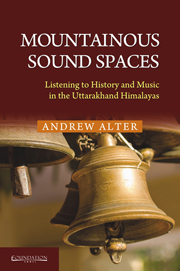Book contents
- Frontmatter
- Contents
- List of Figures
- List of Tables and Musical Examples
- Preface
- Acknowledgements
- Introduction
- 1 Echoes of Colonialism: Bagpipes in the Himalayas
- 2 Echoes of a Royal Heritage: Vestiges of Naubat
- 3 Possession and Performance: Sounding Out the Epic Worlds of Heroes and Gods
- 4 Worlds of Sound: Revisiting the Parameters of Oral Tradition
- 5 Flutes, Sprites and Mountainous Geographies
- 6 Drum Strokes, Syllables and Rhythmic Patterns
- 7 The Significance of Tantric Sects for Drum Practice in the Central Himalayas
- 8 Playing History: Sounding Out the Epic Worlds of Heroes and Gods
- 9 The Legacy of Garhwali Cassettes: Remembering the Pre-digital Age of Music Commodification
- Epilogue: Listening to an Uttarakhandi Himalayan Space
- Bibliography
- Index
5 - Flutes, Sprites and Mountainous Geographies
Published online by Cambridge University Press: 05 October 2014
- Frontmatter
- Contents
- List of Figures
- List of Tables and Musical Examples
- Preface
- Acknowledgements
- Introduction
- 1 Echoes of Colonialism: Bagpipes in the Himalayas
- 2 Echoes of a Royal Heritage: Vestiges of Naubat
- 3 Possession and Performance: Sounding Out the Epic Worlds of Heroes and Gods
- 4 Worlds of Sound: Revisiting the Parameters of Oral Tradition
- 5 Flutes, Sprites and Mountainous Geographies
- 6 Drum Strokes, Syllables and Rhythmic Patterns
- 7 The Significance of Tantric Sects for Drum Practice in the Central Himalayas
- 8 Playing History: Sounding Out the Epic Worlds of Heroes and Gods
- 9 The Legacy of Garhwali Cassettes: Remembering the Pre-digital Age of Music Commodification
- Epilogue: Listening to an Uttarakhandi Himalayan Space
- Bibliography
- Index
Summary
As demonstrated in Chapter 3, references to musical scenes and musical instruments – huṙkīs, nagāṙās, flutes – are a regular feature of many pawāṙās in Uttarakhand. The analysis presented in Chapter 4 highlights the possibility that performance practices associated with oral tradition may well account for the recurrent references to such scenes. Perhaps the most ubiquitous of all such scenes are those with the muralī (flute). The iconic nature of the flute and its sound within a mountainous geography deserves closer attention. This chapter therefore focuses closely on these scenes in order to more fully explore the nature of oral tradition and also to more closely examine the role of the flute within the musical practice of the region.
The story of Jitu Bagadwal is the most well-known pawāṙā in Garhwal that is focused on the flute. In the central episode of the story, Jitu plays his muralī on a high mountain pasture and thereby attracts the mountain sprites that ultimately cause his downfall. The sound of the flute is thereby linked to the dangerous supernatural world of sprites and to the sonic realm of a mountainous geography.
A number of recording artists have released commercially available audio tapes of the story, including Uma Shankar Satish (1987) and Hukam Singh Yadav (n.d.). Though it is primarily a Garhwali story, Jitu Bagadwal is known in parts of Kumaun. The story has become somewhat iconic for the hill regions of Uttarakhand and is frequently interpreted through various artistic mediums including shorter songs, drama and dance.
- Type
- Chapter
- Information
- Mountainous Sound SpacesListening to History and Music in the Uttarakhand Himalayas, pp. 65 - 79Publisher: Foundation BooksPrint publication year: 2014



